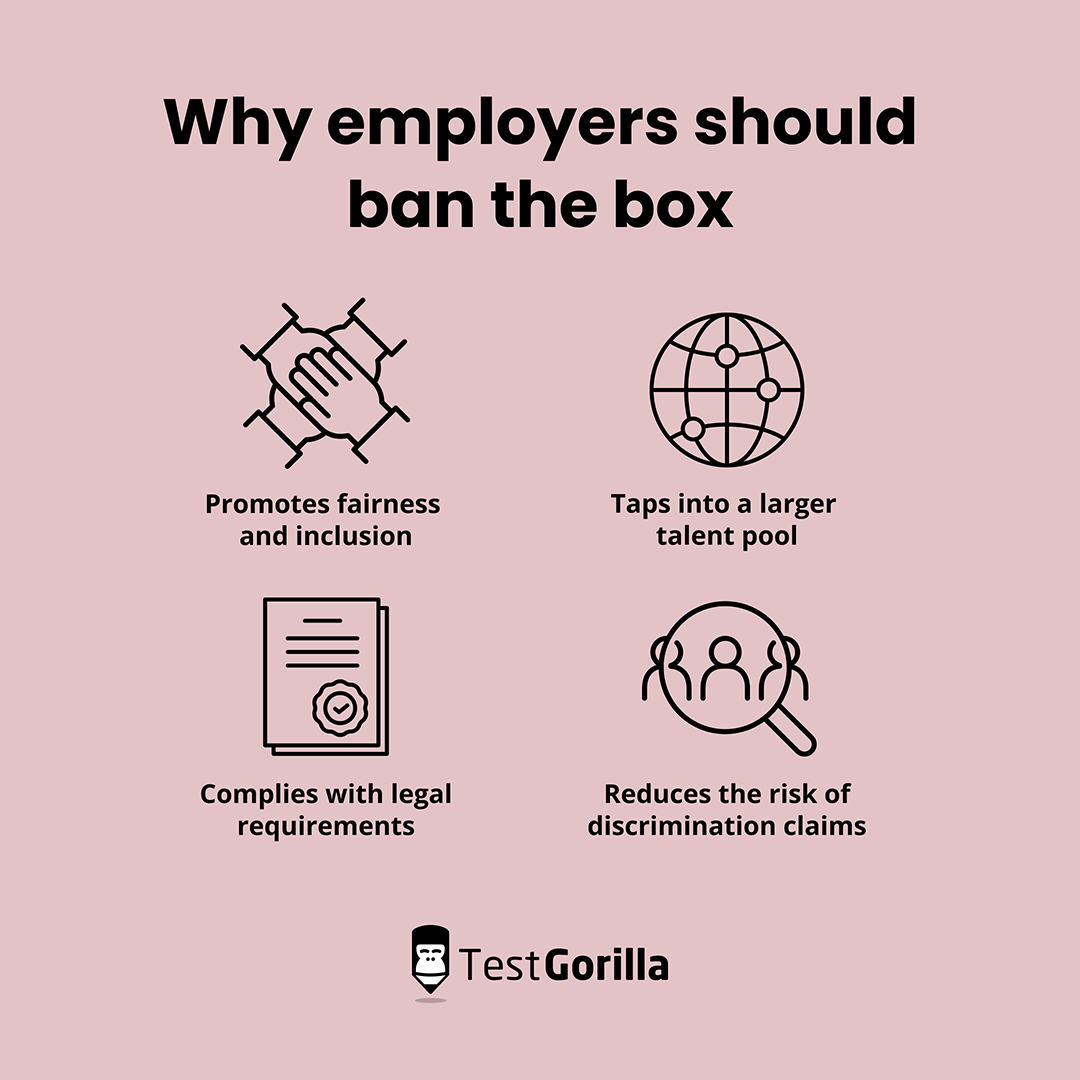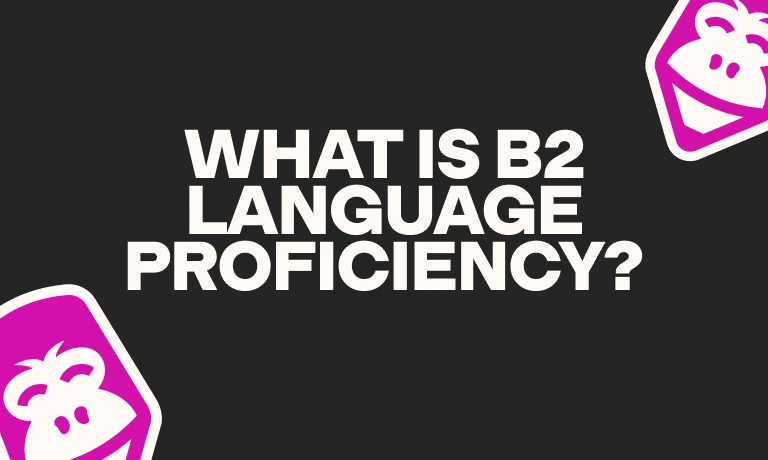Employers are losing out on top candidates because of a single checkbox on application forms that asks applicants to disclose their criminal history and enables employers to conduct background checks. However, a marked checkbox alone is often enough to end an applicant’s prospects in the hiring journey.
Ban the Box policies have been implemented to remove this discriminatory barrier during the application process, giving all candidates a fair chance, and encouraging employers to use bias-free and inclusive recruitment practices, like skills-based hiring.
In this article, we explain the basics of Ban the Box and delve into its effects on employers, candidates, and recruitment processes.
What is Ban the Box?
Ban the Box initiatives are laws and policies advocating the removal of the checkbox that requires job applicants to disclose their criminal history on employment applications.
The aim is to give individuals with criminal records a fair chance at gainful employment by delaying inquiries into their past until later in the hiring process.
Ban the Box has been adopted by numerous states, cities, and private companies across the US. Depending on how regulations are implemented in your jurisdiction, Ban the Box policies can apply to public employers and specific job roles, or include all employers, including private businesses.
The movement emerged as a response to the disproportionate barriers ex-offenders face due to stigma and unfounded beliefs. Studies have shown that 60% of previously incarcerated individuals struggle to find employment after release.
In a 2021 survey, 81% of business leaders and 85% of HR professionals showed that workers with criminal records performed the same or better than those without, indicating that ex-offenders can be effective employees.
With Ban the Box policies in place, those with criminal records have a better chance of being hired. The initiative promotes inclusive hiring and encourages employers to evaluate applicants based on their qualifications, skills, and experience before considering their criminal history.
Why should employers ban the box?
Promotes fairness and inclusion
One of the primary reasons for employers to ban the box is to develop a more diverse workforce and avoid unfair hiring practices.
When employers eliminate the checkbox, they ensure that candidates who are ex-offenders are not immediately dismissed, encouraging a more equitable evaluation of applicants in the form of skills-based testing, work experience, personality, and cultural fit.
Taps into a larger talent pool
By removing the criminal history checkbox, employers can tap into a larger, more diverse applicant pool. They can find top candidates who would have otherwise been eliminated for something as minor as a misdemeanor charge.
This is especially important in industries facing labor shortages, as it enables organizations to consider qualified candidates with criminal records.
Complies with legal requirements
Many jurisdictions have implemented laws and regulations related to Ban the Box, making it mandatory for certain employers to remove this checkbox from their applications.
Employers who fail to comply with these laws may face legal consequences, including fines and penalties. To help employers, the National Employment Law Project (NELP) has published the Ban the Box toolkit.
Tip: It’s best to consult with legal counsel on Ban the Box compliance when conducting a recruitment drive.
Reduces the risk of discrimination claims
Employers who continue to inquire about criminal history on initial applications may inadvertently engage in discriminatory hiring practices. By removing the box, they reduce the risk of discrimination claims, which can be costly and damaging to a company’s reputation.
The best insights on HR and recruitment, delivered to your inbox.
Biweekly updates. No spam. Unsubscribe any time.
How Ban the Box affects recruitment: Pros and cons
Let’s explore the benefits of implementing Ban the Box policies in your hiring process.
Revised screening processes
Employers adopting Ban the Box policies revise their screening processes to promote equal opportunities and prevent biased hiring. Instead of immediately disqualifying candidates with criminal records, employers can conduct initial screenings and focus on skills, personality, and cultural fit.
On digital platforms, hiring managers can change assessment criteria to exclude anything involving criminal backgrounds, and use structured interviews with set questions to eliminate bias.
Deferred background checks
In many cases, background checks that include criminal history inquiries are postponed until after the interview. This lets candidates showcase their abilities and prevents their past from becoming a focal point.
Enhanced diversity
By removing the checkbox, employers can build a diverse workforce, which encourages a broader range of perspectives, leading to increased creativity and innovation within the organization.
Improved public image
Organizations that embrace Ban the Box policies benefit from improved brand image and public perception. They are portrayed as socially responsible and committed to second chances, which can attract both customers and potential employees who value these principles.
Now, let’s take a look at the challenges companies may face banning the box.
Limited information
Delaying background inquiries until later in the hiring process means employers may have limited information for initial screening decisions, making it harder to identify candidates who could pose legitimate risks to the organization or its clients.
Increased screening costs
Conducting background checks after interviews or conditional job offers can be more costly and time-consuming, resulting in higher administrative expenses for employers who have already used company resources on the initial prescreening tools and processes.
Compliance challenges
Ban the Box policies can be complex and vary by jurisdiction, leading to potential compliance challenges for companies operating in multiple locations. Ensuring that hiring practices align with these laws can be daunting for some employers.
In some cases, hiring teams may misunderstand or inconsistently apply Ban the Box practices, leading to confusion among candidates and potential disparities during decision-making.
How Ban the Box impacts candidates
Increased opportunities
The most direct and immediate impact on candidates is the substantial increase in employment opportunities. Ban the Box policies help create a level playing field for all candidates, giving ex-offenders a greater chance of securing employment.
Reduced stigma
In a society that has historically viewed individuals with past convictions as less suitable for employment, Ban the Box policies help reduce the bias associated with a criminal record. Candidates are not immediately judged on their past but on their potential for success.
Greater confidence
When Ban the Box policies are in place, candidates with criminal records approach the job search with greater confidence, which often translates into effective interviews and a stronger commitment to excelling in their chosen roles.
Socio-economic impact
When ex-offenders gain employment, they are less likely to return to illegal activities, reducing recidivism rates. This not only benefits candidates but also contributes to safer communities and lower incarceration costs.
Moreover, employed individuals can support themselves, reducing their reliance on social services and welfare programs, which contributes to a stronger and more stable economy.
How to apply Ban the Box best practices to your next recruitment campaign
Here are five tips to help you implement Ban the Box effectively:
Understand applicable laws and regulations: Familiarize yourself with Ban-the-Box laws in your jurisdiction. These can vary, so it's crucial to know the specific requirements that apply to your organization.
Review and revise job applications: Remove the checkbox and any questions related to criminal history from your initial job applications. Make sure applications comply with Ban the Box laws and are updated to reflect these changes.
Educate your hiring team: Train your hiring team on Ban the Box policies and best practices, ensuring they understand the importance of fair and inclusive hiring and are aware of the legal requirements.
Consistency in implementation: Ban the Box practices must be consistently applied to all candidates. Avoid making exceptions or applying different standards based on personal biases.
Continuously review and improve: Regularly review your Ban the Box policies to identify areas for improvement. Solicit feedback from candidates and employees to promote a fair and inclusive hiring process.
Use TestGorilla for a bias-free recruitment process
Ban the Box is one of the many initiatives that provide equal opportunity for all candidates, regardless of their background. The policy helps ex-offenders get back on their feet and find a steady job, while companies benefit from a larger applicant pool and a more diverse workforce.
Pre-employment testing is the best way to find top-level candidates, without prejudice. It focuses on an individual’s skill set rather than the contents of a resume or a marked checkbox.
TestGorilla’s library of more than 300 skills and personality tests enables hiring managers to make data-backed decisions during recruitment. You can create custom assessments tailored to your open role and conduct structured one-way video interviews with set questions for an impartial evaluation of candidates.
Find out if candidates align with your team and company culture using personality and culture-add tests and avoid the unconscious bias associated with traditional screening methods.
Sign up for free or schedule a free 30-minute live demo to see how TestGorilla can streamline your hiring process and help you discover top talent, without discrimination.
You've scrolled this far
Why not try TestGorilla for free, and see what happens when you put skills first.















